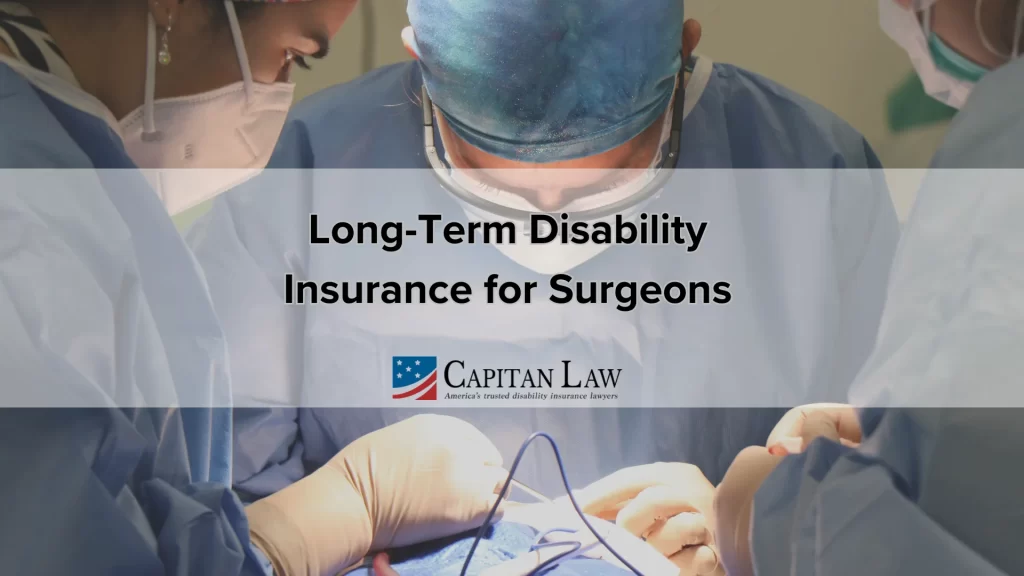
Long-Term Disability Insurance for Surgeons
As a surgeon, you are responsible for your patients’ health and lives. You perform various complicated tasks requiring focus, precision, and skill. When an injury, illness, or disabling condition leaves you sidelined, you likely turn to your long-term disability insurance for financial assistance.
However, insurance companies don’t want to pay claims. Their goal is to save money by underpaying or denying claims whenever possible. Capitan Law knows the tactics insurers use and how to pursue the benefits our clients deserve. For a free consultation to learn more, call our legal team at (267) 419-7888 today.
What You Need to Know About Your Long-Term Disability Insurance
It’s important to understand the coverage available to you in your long-term disability (LTD) plan. There are two ways to receive LTD benefits: an employer-paid plan or an individual policy.
An employer-paid plan is often part of a benefits package an employee receives. The employer pays all or part of the monthly premiums to maintain the coverage. With an individual plan, anyone can purchase a policy and pay the monthly premiums.
Typically, you can tailor an individual plan to your needs. Paying for your own policy can sometimes be preferable to an employer-paid plan because you can shop around for one suited to your unique circumstances. An employer-paid plan will be whatever your employer offers. As a surgeon, you might benefit from having more than one policy for more comprehensive coverage.
Among the essential aspects of an LTD insurance policy is the definition of a disability. The definition indicates the level of impairment someone must have to collect benefits.
Typically, LTD policies contain one of two types of disability definitions – “own occupation” and “any occupation.”
The “own occupation” definition of a disability refers to whether the injured surgeon can perform their job-related duties. The “any occupation” definition of a disability is a bit more complex. It determines whether a surgeon can perform the duties of any job, even in a different position or industry.
Some LTD policies contain both definitions of a disability. That means it starts as an own occupation definition but transitions to an any occupation definition after a specific timeframe. That timeframe is usually between 12 and 24 months.
 Why Surgeons Encounter Challenges Recovering LTD Benefits
Why Surgeons Encounter Challenges Recovering LTD Benefits
Surgeons earn significant salaries due to the level of skill required to operate on patients. They must be in peak mental and physical condition to do their jobs correctly and avoid causing harm. An injury or illness can prevent them from returning to work in any capacity. Receiving approval for an LTD claim can be much more difficult for surgeons.
Insurance carriers prioritize the financial aspect of a surgeon’s disability while reviewing a claim. They consider how much it will cost to provide benefits for a surgeon’s medical condition. The longer it takes to return to work, the more money the insurer must spend on benefits. It also increases the scrutiny a surgeon can face during the claims process.
You can improve your chance of a successful LTD claim by following various tips, such as:
- Submit substantial medical evidence – The insurance company needs evidence of your injury or illness. You must be specific while speaking with your doctors about your symptoms and the physical or mental limitations you experience. Your doctors need that information to make accurate and complete notes in your patient file.
- Prepare for surveillance – Insurance companies comb through every aspect of a surgeon’s life. Since the claim is significant, insurers want to learn everything there is to know to determine whether to provide benefits. That means you will likely be under surveillance. An investigator can follow you wherever you go, stake out your home, and talk to your neighbors. They want to uncover evidence that conflicts with your supposed disability.
- Avoid social media – You should not spend time on social media during your pending claim. Believe it or not, the insurance carrier will comb through your public accounts for evidence they can use against you. Anything they find that disproves the severity of your injury or exhibits an inattention to treating your injury can lead to a denial.
- Don’t return to work too quickly – As a surgeon, saving lives is the best part of the job. You want to get back in the operating room as soon as possible. However, you shouldn’t rush your recovery. Returning to work too soon can compromise your healing and cause you to miss out on LTD benefits you could have received if you continued your treatment.
How to Handle a Denied Long-Term Disability Claim
Just because you file an LTD claim doesn’t mean you’ll get the benefits you need to supplement your lost income. Since the insurance company wants to avoid paying your claim, they will look for any reason to issue a denial.
Knowing you’ll be out of work for a while and unable to collect benefits can be a financial burden. However, you have options. You don’t have to accept your denied claim. You can appeal the insurance carrier’s decision if they deny your claim.
The first step in this process is to review the denial letter. It should explain why the insurer denied the claim and what you can do to appeal the decision.
When you file, you must submit supplemental evidence to strengthen your case, such as:
- More medical records – You might have left some medical documentation out of your initial claim. Missing and incomplete records can lead to a denial. Obtain anything you forgot about and submit it with the appeal.
- Vocational expert statements – Ask a vocational expert for a written statement. They can assess your job-related abilities and explain why your physical or mental limitations prevent you from working as a surgeon.
- Witness statements – Statements from witnesses, such as friends, family, and coworkers, can offer insight into your daily struggles. These people can speak to the pain you experience and how your injury interferes with your routine.
- Treating physician reports – Your treating physician can reinforce the nature of your disabling condition by writing a report. They can provide more detailed information to highlight the aspects of your injury or illness you can’t find in normal medical records.
How Capitan Law Can Help with Your LTD Claim
If you are a surgeon and can no longer work due to your injury or illness, call Capitan Law at (267) 419-7888 for a free consultation immediately.
We understand the consequences of a disability and how much it can hinder your quality and enjoyment of life. We are ready to fight for you whether you’re filing an LTD claim or appealing a denial of benefits.
Related Posts:
 Why Surgeons Encounter Challenges Recovering LTD Benefits
Why Surgeons Encounter Challenges Recovering LTD Benefits